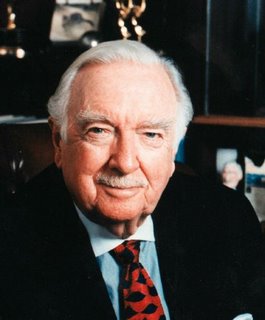
How ironic that Walter Cronkite has died, at age 92, on the 40th anniversary of the news story he most loved covering — the Apollo 11 mission to the moon.
It may be hard for some viewers to understand the impact Cronkite had, from a time when there were so few television news outlets that his only competition was Huntley & Brinkley on NBC (and he left them in the dust in 1967, when his ratings surpassed theirs and never dipped until he stepped down in 1981).
The 24-hour news networks are talking it up tonight, and CBS will do a primetime retrospective of his career on Sunday night, but Cronkite’s death won’t get nearly as much attention or adulation as Michael Jackson’s. Yet his imprint on history is much greater. How important was he? Try to name one person today — on or off TV — who anyone would call The Most Trusted Person In America.
I’ve dug into my archives to find an interview I did with Cronkite on June 25, 2001, in which we talked about his voice work on “Apollo 13” and his love of the space program. We also delved at length into his criticisms of television newscasts he felt had become “cheapened” by giving people what they want to know rather than what they need to know.
Cronkite also lamented the lack of reporters in foreign countries:
“These are the days when a bonfire in a little country whose name we can’t pronounce in a location on the globe we don’t know, that bonfire can suddenly turn into a mushroom-shaped cloud. We’d damned well better know what’s going on, and we don’t!”
Those words seem fairly prescient in retrospect, considering this was less than three months before the 9/11 attacks forced the networks to cover places on the map they had ignored for too long.
Listen to our conversation here.
In watching some of the video obits of Cronkite, I was struck by a few things: no one makes it as a network anchorman anymore with facial hair and glasses, and very few of them are so trusted that they can show even a little emotion, as Cronkite did on the day he reported the death of JFK, or the enthusiasm he showed as Armstrong and Aldrin landed on the lunar surface.
